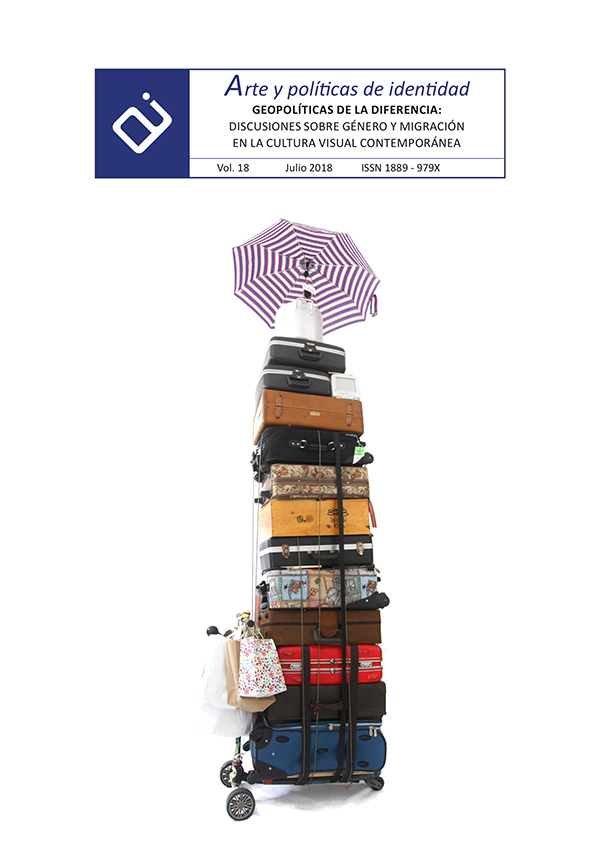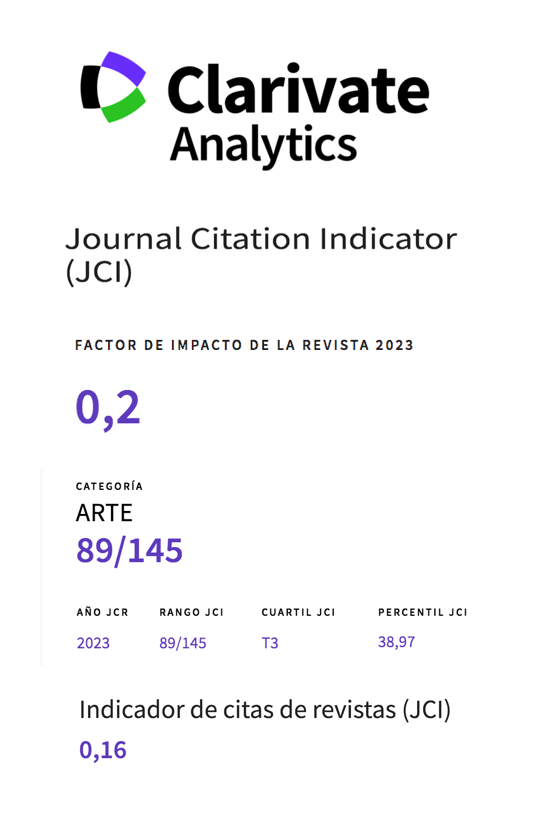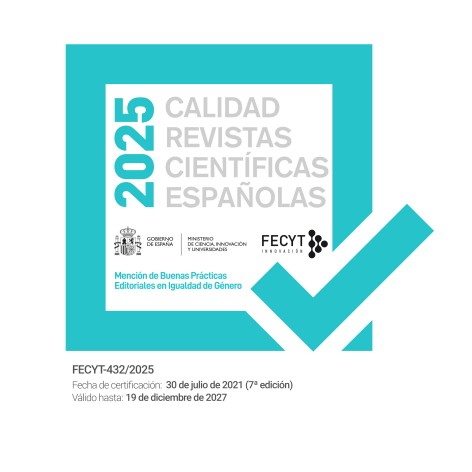Correspondences ’in the Name of’ the Song
Neighborhood, Immigration, Approval
Abstract
The intersections between symbolic productions, migration and nationality will be analysed from the desire of recognition promoted by mass media imaginaries, in this case though the audio-visual show of the Eurovision Song Contest. Its archivist potential, explored from the image –like visual studies, arts or scenography, as well as sociology, anthropology or ethnomusicology– is pierced by the centrality of the ‘nation’ politic fiction, studied by Anderson, Huntington, Brah or Sennett. Even though the contest emphasizes his musical and cultural aspect, the continuous repetition of the name of the nation and the presence of the flag makes this show a field inclined to the creation of affinities and adversities called upon the Song. We will follow two synchronic rounds, first through the tensions of the contestant countries in the gathered voting analysis in all Eurovision history, and second, through those entries that has been represented by singers from ‘others’ origins. This two ways will be articulated by the different groups of nation blocks, verifying how all this issues affects to the pacifist collaborative creation that characterizes the Eurovision Song Contest.
Downloads
-
Abstract628
-
PDF (Español (España))461
References
Anderson, B. (2006 [1983]). Comunidades imaginadas. Reflexiones sobre el origen y la difusión del nacionalismo. México D. F.: Fondo de Cultura Económica.
Baker, C. (2015). Gender and Geopolitics in the Eurovision Song Contest. Contemporary Southeastern Europe, 2(1), 74-93.
Baumgartner, M. (2007). Chanson, canzone, schlager, and song: Switzerland’s identity struggle in the Eurovision Song Contest. En Raykoff, I. y Tobin, R. D. (eds.) A song for Europe. Popular Music and Politics in the Eurovision Song Contest (pp. 37-49). Aldershot: Ashgate.
Björnberg, A. (2007). Return to Ethnicity: The cultural significance of musical change in the Eurovision Song Contest. En Raykoff, I. y Tobin, R. D. (eds.) A song for Europe. Popular Music and Politics in the Eurovision Song Contest (pp. 13-25). Aldershot: Ashgate.
Bohlman, A. F. y Rehding, A. (2013). Doing the European two-step. En Tragaki, D. et al., Empire of song: Europe and Nation in the Eurovision Song Contest (pp. 299-316). Plymouth: The Scarecrow Press.
Bohlman, P. V. (2013). Tempus Edax Rerum. Time and the Making of the Eurovision Song. En Tragaki, D. et al., Empire of song: Europe and Nation in the Eurovision Song Contest (pp. 35-56). Plymouth: The Scarecrow Press.
Bohlman, P. V. (2004). The Music of European Nationalism. Cultural identity and modern history. Santa Barbara: ABC-CLIO.
Bourdieu, P. (2010). El sentido social del gusto. Elementos para una sociología de la cultura. Madrid: Siglo veintiuno.
Brah, A. (2011). Cartografías de la diáspora. Identidades en cuestión. Madrid: Traficantes de Sueños.
Brea, J. L. (ed.) (2005). Estudios visuales: la epistemología de la visualidad en la era de la globalización. Madrid: Akal.
Castells, M. y Himanen, P. (2002). La sociedad de la información y el Estado del bienestar. Madrid: Alianza editorial.
Fricker, K. (2013). ‘It’s just not funny anymore’: Terry Wogan, Melancholy, Britain, ant the Eurovision Song Contest. En Fricker, K. y Gluhovic, M. Performing the ‘New’ Europe: Identities, Feelings and Politics in the Eurovision Song Contest. Londres: Palgrave Macmillan, pp. 53-76.
Ginsburgh, V. y Noury, A. (2008). The Eurovision Song Contest. Is voting political or cultural?. European Journal of Political Economy, 24, 41-52.
Guasch, A. M. (ed.) (2006). La crítica dialogada. Madrid: Akal.
Guillén Marco, P. (2018). ¿Espectáculo de la memoria o memoria del espectáculo? La representación del genocidio en el festival de Eurovisión. Eu-topías. Revista de interculturalidad, comunicación y estudios europeos, 15, 67-75.
Gumpert, M. (2007). ‘Everyway That I Can’: Auto-Orientalism at Eurovision 2003. En Raykoff, I. y Tobin, R. D. (eds.) A song forEurope. Popular Music and Politics in the Eurovision Song Contest(pp. 147-159). Aldershot: Ashgate.
Huntington, S. P. (1997 [1996]). El choque de civilizaciones. Y la reconfiguración del orden mundial. Barcelona: Paidós Ibérica.
Ingvolstad, B. (2007). Lithuanian contests and European dreams. En Raykoff, I. y Tobin, R. D. (eds.) A song for Europe. Popular Music and Politics in the Eurovision Song Contest (pp. 99-111). Aldershot: Ashgate.
Jordan, P. (2014). The Modern Fairy Tale: Nation Branding, National Identity and the Eurovision Song Contest in Estonia. Tartu: University of Tartu Press.
Lam, C. (2018). Representing (real) Australia: Australia’s Eurovision entrants, diversity and Australian identity. Celebrity Studies, 9(1), 117-125.
Meerzon, J. y Piven, D. (2013). Back to the future: Imagining a new Russia at the Eurovision Song Contest. En Fricker, K. y Gluhovic, M. Performing the ‘New’ Europe: Identities, Feelings and Politics in the Eurovision Song Contest (pp. 111-124). Londres: Palgrave Macmillan.
Motschenbacher, H. (2016) A corpus linguistic study of the situatedness of English pop song lyrics. Corpora, 11(1), 1-28.
Mutsaers, L. (2007). Fernando, Filippo, and Milly: Bringing blackness to the Eurovision stage. En Raykoff, I. y Tobin, R. D. (eds.) A song for Europe. Popular Music and Politics in the Eurovision Song Contest (pp. 61-70). Aldershot: Ashgate.
Orfali, K. (1991 [1987]). Un modelo de transparencia: la sociedad sueca. En Ariès, P. y Duby G. (eds.) Historia de la vida privada. Madrid: Taurus.
Panea, J. L. (2017). El Festival de Eurovisión como convocatoria para la fijación de imaginarios: hospitalidad, contención, pronunciación y serialidad. Fedro. Revista de Estética y Teoría de las Artes, 17, 80-111.
Sennett, R. (2006 [1998]). La corrosión del carácter. Las consecuencias personales del trabajo en el nuevo capitalismo. Barcelona: Anagrama.
Szeman, I. (2013). ‘Playing with fire’ and playing if safe: With(out) Roma at the Eurovision Song Contest?. En Fricker, K. y Gluhovic, M. Performing the ‘New’ Europe: Identities, Feelings and Politics in the Eurovision Song Contest (pp. 125-141). Londres: Palgrave Macmillan.
Todorov, T. (1995). La vida en común. Ensayo de antropología general. Madrid: Taurus.
Virilio, P. (2003 [1980]). Estética de la desaparición. Barcelona: Anagrama.
Vuletic, D. (2018). Postwar Europe and the Eurovision Song Contest. Londres y Nueva York: Bloomsbury.
Zaroulia, M. (2013). ‘Sharing the moment’: Europe, Affect, and Utopian Performativities in the Eurovision Song Contest. En Fricker, K. y Gluhovic, M. Performing the ‘New’ Europe: Identities, Feelings and Politics in the Eurovision Song Contest (pp. 31-52). Londres: Palgrave Macmillan.
Works published in this journal are subject to the following terms:
- The Service of Publications from the University of Murcia (publishing house) keeps the published works’ copyrights, and favors and allows the reuse of these works under the license indicated in point 2.
- Works are published in the journal’s online edition under the license Creative Commons Reconocimiento-NoComercial-SinObraDerivada 3.0 España(texto legal). They can be copied, used, disseminated, transmitted and publicly exhibited, as long as: i) the author and original source of publication are cited (journal, publishing house and work’s URL); ii) they are not used for commercial purposes; iii) the existence and specifications of this license are mentioned.
3. Conditions for auto-file. It is allowed and encouraged that authors share electronically their pre-print version (the pre-reviewed version) and /or post-print version (the reviewed and accepted version) of their Works before the publication, since it promotes its circulation and dissemination. RoMEO color: green.










